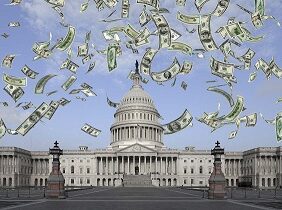Congress has racked up nearly $17 trillion in national debt, in part due to unnecessary taxpayer spending on mature industries such as corn ethanol. This spending habit is enabled by lawmakers who refuse to acknowledge the plethora of subsidies showered upon these industries. For instance, at a policy forum last week, Representative Steve King (R-IA) asserted, “there is no subsidy for corn-based ethanol.”
Rep. King was no doubt attempting to placate the corn ethanol lobby and the many corn growers in his northwest Iowa district, but his statement deserves to be set straight.
Corn-based ethanol was first produced and blended into gasoline in the late 1970’s after gas price spikes and environmental problems with lead contamination prompted a search for alternatives to petroleum-based fuels and certain fuel additives. As Rep. King conceded, the nascent industry “had to go to government, to get market access,” that is, to make it economically viable. Hence, Congress created a tax credit for ethanol use in the
Energy Tax Act of 1978 whereby fuel blenders received $0.40 for each gallon of ethanol blended with gasoline. The credit’s successor, the $0.51 per gallon Volumetric Ethanol Excise Tax Credit (VEETC), was enacted in 2004 and reduced to $0.45 per gallon in the 2008 farm bill.
While VEETC was finally eliminated at the end of 2011 (in addition to the tariff on imported ethanol), corn ethanol subsidies live on. The federal Renewable Fuel Standard (RFS) was created and expanded in the 2005 and 2007 energy bills, respectively, mandating that fuel blenders use a minimum amount of corn-based ethanol each year. Recalling such treatment, Rep. Peter Welch (D-VT) remarked at the forum, “I can’t think of another product in the American economy that really had the trifecta – a tariff barrier, a subsidy, and a mandate.” This trifecta of subsidies has resulted in numerous unintended consequences, such as greater greenhouse gas emissions and higher food and feed prices. Rep. King admitted the latter when he posited what would happen if the RFS was repealed: “I believe that it would […] drive your corn prices down significantly,” even though corn ethanol lobbyists have historically refused to acknowledge that federal corn ethanol supports increase corn prices.
Even if Rep. King attempts to argue that the RFS isn’t a subsidy, he surely can’t ignore all the other government giveaways for ethanol. The industry enjoys subsidies through farm bill energy title programs such as the Rural Energy for America Program and the Bioenergy Program for Advanced Biofuels; tax breaks such as the Alternative Fuel Vehicle Refueling Property Credit, Master Limited Partnerships, and biodiesel tax credits; and various Departments of Energy and Transportation programs. Worse yet, on Sept. 30, another member of the Iowa Congressional delegation Senator Harkin (D-IA) proposed billions more in new ethanol subsidies such as those for blender pumps, storage tanks, and biofuels pipelines.
Sorry Mr. King, but subsidies for corn ethanol still exist, unnecessarily burdening taxpayers and consumers at a time when the U.S. can least afford it. If we want to get serious about kicking the habit of irresponsible spending that has ballooned our national debt, we should start by accepting reality.











Get Social